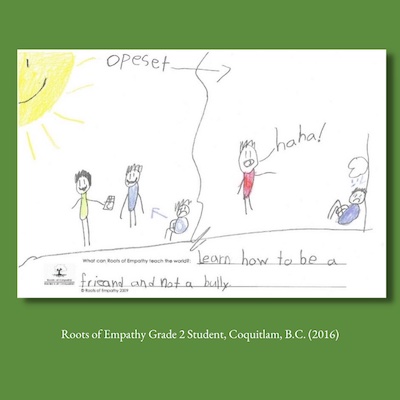Roots of Empathy reduces aggressive behaviour, including bullying, which leads to better relationships
Part of a series (see all)

“Learn how to be a friend and not a bully.”
Experts say:
Aggressive children often have fewer social, cognitive, and emotional regulation skills available to them and are therefore more likely to be rejected by other children, and are less likely to get along with teachers (Schick & Cierpka, 2016; Mulvey et al., 2017; Decker et al, 2007; McGrath & Van Bergen, 2015). Children who exhibit high levels of externalizing behaviours (e.g., aggression, disruption, hyperactivity) are often victims of social exclusion. Those who are excluded based on this behaviour are more likely to continue exhibiting these behaviours at increasing rates over time (Mulvey et al., 2017). Children who display early aggressive behaviour are also at highest risk for many negative outcomes, including depression, suicide attempts, alcohol and drug abuse, violent crimes, and neglectful and abusive parenting (Tremblay, 2004).
Evidence Roots of Empathy decreases aggressive behaviour, including bullying:
- Teacher ratings showed less aggressive behaviours (ex: threatening others, bullying, hitting, or trying to get others to dislike a person) in the children participating in the Roots of Empathy program (Santos et al., 2011)
- Teacher ratings showed that children in the Roots of Empathy program decreased in proactive aggression (ex: gets other children to gang up on a peer that he/she does not like’’) and relational aggression (ex: when mad at someone, tries to get others to dislike that person). An increase in both forms of aggression was observed in children not participating in the program (Schonert-Reichl et al., 2012)
- All participants reported that bullying and aggression decreased in the Roots of Empathy classrooms (Cain & Carnellor, 2008)
- Teacher ratings showed children who participated in the program showed reduced difficult behaviors, measured by considering conduct problems, emotional symptoms, hyperactivity, and peer problems (Connolly et al., 2018)
- The beneficial effects of the Roots of Empathy program on aggression were maintained or continued to improve even after the program ended in the 1, 2, and 3 year follow-up testing (Santos et al., 2011)
Back to The Roots of Longevity & Quality of Life
*****
References:
Cain, G., & Carnellor, Y (2008). Roots of Empathy: A research study on its impact on teachers in Western Australia. Journal of Student Wellbeing, 2(1), 52-73.
Connolly, P., Miller, S., Kee, F., Sloan, S., Gildea, A., McIntosh, E., & Bland, J. M. (2018). A cluster randomised controlled trial and evaluation and cost-effectiveness analysis of the Roots of Empathy schools-based programme for improving social and emotional well-being outcomes among 8-to 9-year-olds in Northern Ireland. Public Health Research.
Decker, D. M., Dona, D. P., and Christenson, S. L. (2007). Behaviorally at-risk African American students: the importance of student–teacher relationships for student outcomes. Journal of School Psychology, 45, 83–109. doi:10.1016/j.jsp.2006.09.004
McGrath, K., and Van Bergen, P. (2015). Who, when, why and to what end? Students at risk of negative student-teacher relationships and their outcomes. Educational Research Review, 14, 1-17. https://doi.org/10.1016/J.EDUREV.2014.12.001.
Mulvey, K. L., Boswell, C., and Zheng, J. (2017). Causes and Consequences of Social Exclusion and Peer Rejection Among Children and Adolescents. Report on emotional & behavioral disorders in youth, 17, 71–75. https://www.ncbi.nlm.nih.gov/pmc/articles/PMC6085085/
Santos, R.G., Chartier, M.J., Whalen, J.C., Chateau, D., & Boyd, L. (2011). Effectiveness of school-based violence prevention for children and youth: Cluster randomized controlled field trial of the Roots of Empathy program with replication and three-year follow-up. Healthcare Quarterly, 14, 80-90.
Schick, A., and Cierpka, M. (2016). Risk factors and prevention of aggressive behavior in children and adolescents. Journal for Educational Research Online, 8, 90-109. doi: 10.25656/01:12034
Schonert-Reichl, K. A., Smith, V., Zaidman-Zait, A., & Hertzman, C. (2012). Promoting children’s prosocial behaviours in school: Impact of the “Roots of Empathy” program on the social and emotional competence of school-aged children. School Mental Health 4(1), 1-12.
Tremblay, R. (2004). Physical aggression during early childhood: trajectories and predictors. Pediatrics, 114, e43–e50. https://doi.org/10.1542/peds.114.1.e43.